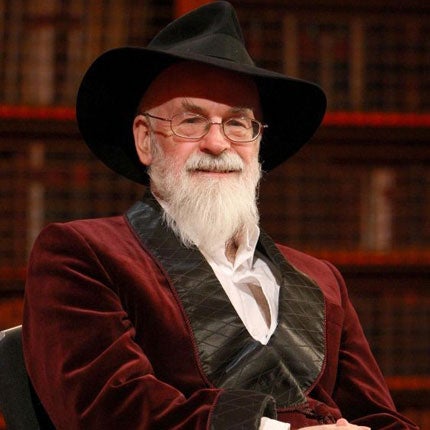Terry Pratchett: Witty, zany, topical, and wise: not in discrete chunks, but all at once

Sir Terry Pratchett, who died today, occasionally received letters from fans who had a terminal illness. They hoped, so he reported, that the Death they would meet might resemble his own much-loved Reaper. Pratchett imagined Death as a curious, rather kindly figure, a lover of cats and curry, often perplexed by humanity’s taste for self-delusion and always with a taste for EXPRESSING HIMSELF IN CAPITALS.
Over the 40 books of his Discworld series, Pratchett proved that no subject lay beyond the reach of his own, incomparable brand of comic fantasy – and certainly not the end of life. Diagnosed with early-onset Alzheimer’s in 2007, he explored his own condition with the quizzical humour, intellectual zest and sheer generosity of spirit that marked his fiction.
Mid-career he sometimes felt undervalued, despite his unflagging commercial success (with around 85 million books sold). Belatedly, awards and acclaim – from a knighthood to the enthusiasm of fellow writers such as AS Byatt – began to match his popular following. A master of comic timing, a sculptor of drily funny sentences, and a cultural magpie who lined his Discworld nest with ideas and allusions from arts, sciences and histories, Pratchett proved that the British fantasy tradition could stand as close to PG Wodehouse as to JRR Tolkien.
Discworld boasts an eighth colour in the spectrum: octarine. It is (to quote the title of the series’ first volume) the colour of magic. Pratchett brought that into millions of lives.
Join our commenting forum
Join thought-provoking conversations, follow other Independent readers and see their replies
Comments
Bookmark popover
Removed from bookmarks